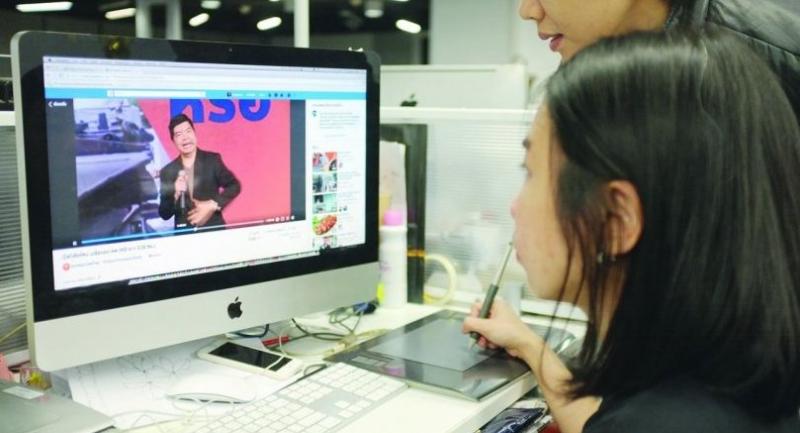Social media to play major role in vote

For the first time since the last general election five years ago, Thailand is witnessing the fast-growing power of social media platforms, especially among young voters, indicating the polls expected in March this year will be significantly influenced by Line, Facebook, Twitter and other non-traditional media.
Mana Treelayapewat, dean of the School of Communication Arts at the University of the Thai Chamber of Commerce, said political parties have been using social media much more to try and win votes due to the online platforms’ high penetration among the country’s 50-million-plus voters.
For the upcoming election, the number of first-time voters age 18 and up is estimated to be around seven million, and social media are their preferred means of communication.
Most social networks are being used to present the parties’ policies and activities and the details of MP candidates, Mana said.
Voters will have to be on guard against the dissemination of content that’s subtly distorted to win votes, he said. Traditional media outlets can also be misled by such inaccurate content, so they too must carefully vet it before publishing or broadcasting.
One tactic employed by social-media experts engaged by political parties is to spread alternative views and partial truths in ways that benefit the parties. This is done by misleading the audience to discredit rival parties or by falsely favouring their own parties and candidates.
Parties also use Twitter for quick and real-time communications with their base, while turning to Facebook for group communications and engagement. The Line platform can be used for both one-on-one and group communication. For controversial and viral video content, YouTube is used together with other platforms to spur social media interest.
“The role of micro-influencers is growing rapidly because they play a similar role to that previously done by party canvassers, especially with regard to discussing party policies,” said Chanut Kerdpradub, a social-media communication specialist.
Micro-influencers on the Web and mobile devices are also useful for reaching niche and special-interest groups, whose votes are crucial to election outcomes but are often hard to reach and activate before the vote.
Content on social media can influence more than just first-time and young voters, Chanut said. Senior citizens tend to prefer Line, for example. Overall, political parties will aim to use social networks to penetrate specific voter groups with customised contents based on data analysis and artificial intelligence tools.
Chanut said traditional media will see their role and influence decline in the coming election due to the rapid digitalisation of the Thai economy and society. Social media are also seen as more efficient and cost-effective in getting the message out, while also allowing parties to devise more innovative campaigns and communication strategies.
In fact, politicians in this vote will have the best of both worlds, discussing big themes with the masses while also delivering customised content to specific voter groups, he said. The parties also have to prepare to an unprecedented degree for crisis management to respond to fake or misleading news.
Most first-time voters are “native” users of social media with a high degree of competence with the technology, Chanut said, while traditional media such as TV outlets are relatively unknown to them, so parties with creative and effective social-media campaigns will have a significant advantage.
For the upcoming election, key factors that could decide the election involve age and rural versus urban voters, where older provincial voters are more supportive of populist policies while younger urban voters who use social media are less likely to support populist policies.
Sakulsri Srisaracam, head of the Convergent Journalism Department at the Panyapiwat Institute of Management, said subtle social-media content, especially fake and misleading news, will play a crucial role in the election outcome because it’s often hard for voters to discern the truth of reports. Truths and half-truths will abound as the election nears, resulting in more alienation among voters, he said. There thus needs to be an “election literacy” component on social media.
Nuttaputch Wongreanthong, a digital marketer, said social media are not like broadcasting since it is much easier to slip through unverified content, such as via the use of personalised and dynamic ads on Facebook and Google.
In this format, each group of voters gets a different message aimed at their specific behaviour, preferences, biases or frames of reference.
Targeting highly personalised content for each voter does not bode well for a democracy, he said, because voters are supposed to make judgements based on the same set of data in a free and fair election.
As a result, the Election Commission’s mission is to ensure that social-media content is properly vetted. Poomjit Sirawongprasert, Thai-directory editor for Curlie.org, believes that fake and misleading news will be prominent in this election campaign as parties aim to gain advantages over rivals, particularly for the swing votes among young and first-time voters.
